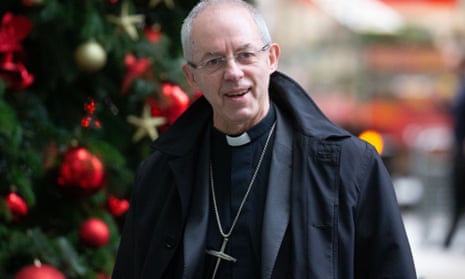Church of England bishops have said they are praying for “courage, integrity and clarity for our politicians” after a week of turmoil over Brexit.
In a joint statement issued on Saturday, the bishops also urged the country to “consider the nature of our public conversation” and called for more grace and generosity.
The statement echoes concerns raised by the archbishop of Canterbury in the House of Lords on Friday when he stressed the need for reconciliation after a “week of deep division” over Brexit.
Justin Welby said it was central to the country’s future that the divisions were healed.
The joint statement released by the bishops after they met in London said: “In the light of this week’s turbulent events, the bishops of the Church of England pray for national unity – and courage, integrity and clarity for our politicians.
“We call on the country to consider the nature of our public conversation. It is time to bring grace and generosity back to our national life. At the heart of the Christian message is Jesus’ command to love our neighbour. This includes those with whom we agree and disagree – at home, in Europe, and further afield.
“We urge everyone – our political leaders and all of us – to bring magnanimity, respect and reconciliation to our national debate. There is now an urgent need for the United Kingdom to recover a shared vision and identity to help us find a way through the immediate challenges.”
The unprecedented statement came as the Conservative MP Jo Johnson called on Theresa May to let MPs vote on her Brexit deal.
Johnson accused No 10 of trying to delay the vote on the Brexit deal until the last minute.
Johnson, who resigned as transport minister in protest at May’s EU withdrawal agenda, told BBC Radio 4’s Today programme: “The time has come for us to hold this vote. I am concerned that No 10 is running down the clock.
“Resilience is an admirable quality, and the prime minister has displayed it in abundance, but there comes a point where resilience starts to border on stubbornness and obstinacy, and I’m worried that we are reaching that point.”
Quick GuideBrexit and backstops: an explainer
Show
A backstop is required to ensure there is no hard border in Ireland if a comprehensive free trade deal cannot be signed before the end of 2020. Theresa May has proposed to the EU that the whole of the UK would remain in the customs union after Brexit, but Brussels has said it needs more time to evaluate the proposal.
As a result, the EU insists on having its own backstop - the backstop to the backstop - which would mean Northern Ireland would remain in the single market and customs union in the absence of a free trade deal, prompting fierce objections from Conservative hard Brexiters and the DUP, which props up her government.
That prompted May to propose a country-wide alternative in which the whole of the UK would remain in parts of the customs union after Brexit.
“The EU still requires a ‘backstop to the backstop’ – effectively an insurance policy for the insurance policy. And they want this to be the Northern Ireland-only solution that they had previously proposed,” May told MPs.
Raising the stakes, the prime minister said the EU’s insistence amounted to a threat to the constitution of the UK: “We have been clear that we cannot agree to anything that threatens the integrity of our United Kingdom,” she added.
If, instead, the prime minister pushed ahead with plans to delay the vote until January, Johnson said it would in effect be “giving parliament no choice at all, except between her deal – flawed as it is, and facing fundamental opposition across all sides of the house – and no deal at all. And that’s an unacceptable choice for parliament.”
May postponed the vote on her Brexit deal earlier this week, admitting concern among her MPs about the Irish backstop proposals would have resulted in her losing the vote by a large margin. The government has promised the vote will take place before 21 January.
Johnson said: “We need to get on with it, and the first step is to eliminate her deal from the table. If the vote is deferred again when we come back on Monday, very serious conversations will be had by members of the cabinet and members of parliament asking: ‘Well, what is the strategy?’”.
The foreign secretary, Jeremy Hunt, told the Today programme that May’s deal was the only one on the table, “but the thing that the House of Commons will not accept is any risk of us being permanently trapped, through the Northern Irish backstop, in the customs union.
“I think it is possible to get this deal through with those guarantees that we need on the backstop.” He said it was within the EU’s interest to avoid a further political crisis in the UK and stop a no-deal scenario.
May embarked on a frantic round of European diplomacy in a final attempt to salvage her Brexit deal after delaying the vote, but was largely rebuffed by European leaders who stood firm in their refusal to renegotiate the withdrawal agreement. She returned home on Friday having failed to achieve any breakthrough over the backstop.
